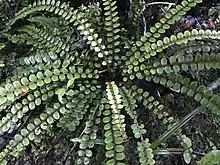Cranfillia fluviatilis
Cranfillia fluviatilis, synonym Blechnum fluviatile, is a fern known in the Māori language as kiwikiwi. A herbaceous plant, C. fluviatilis is a "hard fern" of the genus Cranfillia in the family Blechnaceae. It was identified by Patrick Brownsey in 1979.[2] Other common names are star fern, creek fern, kawakawa and kiwakiwa.[3][2]
| Cranfillia fluviatilis | |
|---|---|
 | |
| Scientific classification | |
| Kingdom: | Plantae |
| Clade: | Tracheophytes |
| Division: | Polypodiophyta |
| Class: | Polypodiopsida |
| Order: | Polypodiales |
| Suborder: | Aspleniineae |
| Family: | Blechnaceae |
| Genus: | Cranfillia |
| Species: | C. fluviatilis |
| Binomial name | |
| Cranfillia fluviatilis | |
| Synonyms[1] | |
| |
Morphology
Ladderlike fronds of C. fluviatilis measure up to 50 cm (20 in) long. Growing in a distinctive ground-hugging rosette shape, its fertile fronds – dark brown and spiky – stand upright from the centre, while the drooping sterile fronds with their nearly round leaflets, form the rosette.[3] As the parent plant ages it develops a short trunk central to a surrounding colony.
Range and ecology
The hardy C. fluviatilis requires moist, shaded conditions for optimal growth. A small ground fern, the species is native to New Zealand and southeast Australia, a syntype common throughout the country in damp, shady areas in acidic, moist and boggy soil,[4] beside streams in forest areas.[3] This fern species occurs throughout much of New Zealand's forests, including much of the forested area of North Island; west, north and south coasts of South Island; and Stewart Island/Rakiura; moreover, it occurs in parts of the coastal forests of southeast Australia. Example understory flora associates in the mixed broadleaf/podocarp forests of Rakiura include Austroblechnum durum.[5]
History
It was collected by William Colenso in December 1841, at the precise locality of woods near Poverty Bay in the North Island.[2]
References
- Hassler, Michael & Schmitt, Bernd (November 2019), "Cranfillia fluviatilis", Checklist of Ferns and Lycophytes of the World, 8.11, retrieved 2019-12-22
- Blechnum fluviatile (R.Br.) Salomon; syntype of Lomaria rotundifolia Colenso - Collections Online - Museum of New Zealand Te Papa Tongarewa, Wellington, NZ
- "Blechnum fluviatile". Archived from the original on 2013-02-06. Retrieved 2008-05-11.
- BBC - Gardening - Plants - Plant Finder - Blechnum fluviatile 'Klwaklwak'
- C. Michael Hogan. 2009. Crown Fern: Blechnum discolor, Globaltwitcher.com, ed. N. Stromberg Archived 2012-02-13 at the Wayback Machine